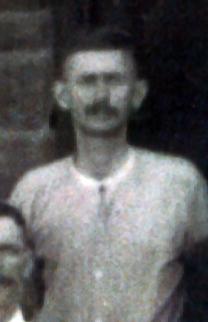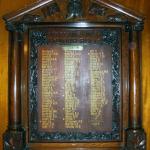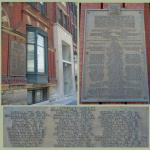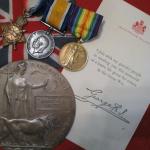Circumstances of Casualty: Killed in Action.
Location of Unit at Time of Casualty: Trenches North West of Arleux.
BX July 12, 1917
C.Q.M.S. A.J. Mott Killed in Action – Popular Member of Dufferin Rifles Gave His Life for the Empire
Word was received in the city yesterday that Company Q.M.S. Alfred John Mott has been killed in action in France. He went from Brantford with the first contingent, as color sergeant with the then Captain Malcolm Colquhoun. He was an enthusiastic member of the Dufferin Rifles and was one of the most popular men of the regiment. He was a sergeant in “A” Company for six years, and was the crack shot of the regiment winning the Dufferin Medal at the annual shoot of the regiment in 1910, getting a possible 50 out of 50 which has not yet been equaled. When war broke out, Mott was a sergeant in the 38th Regiment. Shooting and signalling were his hobbies. He also served six years in South Africa and went through the Boer War. His large circle of friends and ex-cadets with whom he was very popular, will be sorry to hear of his death and his smiling face and bright manner will be missed from “A” Company rooms at the armories.
The news was received in a letter sent by Sergeant George Crouch, D.C.M., from the front, to a friend in Brantford. The letter was dated June 14 and Sergeant Crouch wrote that he had a few days previously attended Sergeant Mott’s funeral. Sergeant Mott was a single man and a mechanic by trade.
BC July 18, 1917
Met Death While Taking Rations to the – Letter From Front Tells How C.Q.M.S. Alfred John Mott laid Down Life – A Strict Disciplinarian, Yet He Had Always a Smile – Touching Funeral
Writing from the front, Sergeant Bob Cross of the Mad Fourth Battalion sends to the editor of The Courier the following account of the death of Company Quartermaster Sergeant Jack Mott recently reported killed in action:
June 19, 1917
France
Editor Courier,
The news will be received with feelings of deepest regret in Brantford, more especially in military circles, of the death of Co’y Q.M.S. Jack Mott, who was killed on the night of the 13th June, whilst taking rations up to the trenches along a shell swept road. Mott had taken rations up for B. Coy steadily for two years and three months, and, as was more often the case than not, along roads that were dangerous in the extreme. The burial took place a couple of days later, in a tiny military graveyard behind the firing line, and as is usual with battlefield funerals, the simplicity of the proceedings made the ceremony all the more impressive. He was followed to the grave by about 20 non-coms, the Chaplain, transport officer and buglers. After the burial service had been read, the Last Post was sounded to the accompaniment of the roar of heavy artillery all round us. No gorgeous funeral hearse, no gun carriage, no pomp and ceremony attended this burial – the body was conveyed to the grave yard in a wagon and from the gates of the graveyard to the grave by the bearers. The grand old flag covered the body, and so was laid to rest as fine a specimen of British soldier as ever donned the King’s uniform.
Sergeant Bob Cross
Mott was a veteran of the Boer War, a deadly rifle shot, and an expert on Morse and Semaphore signalling, etc. He was for many years a member of the Dufferin Rifles, a regiment by the way, often sneered at in peace time, but whose members lie sleeping by the hundred beneath the bloodstained fields of France and Flanders. Some years ago, he won the Dufferin medal, and was always an active enthusiastic worker for “A” Co. of the 38th. A strict disciplinarian, yet he always had a smile and a kind word for all, and his death is very keenly felt by both officers and men of the 4th Battalion.




